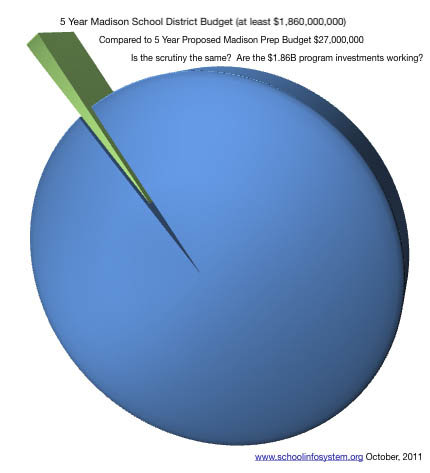Ed Hughes has a problem.
Like most of his fellow school board members and practically everyone else in Madison, he was bowled over by Urban League president Kaleem Caire’s vision for Madison Prep, a charter school that would aggressively tackle the school district’s entrenched minority achievement gap.
“The longer day, the instructional focus, and the ‘no excuses’ approach appealed to me,” Hughes says.
But as he looked into the details, Hughes became more and more concerned about the cost of the school and “whether there is a good match between the problem we are trying to address and the solution that’s being proposed.”
Expressing those doubts in his blog has turned the soft-spoken Hughes into a heretic.
Caire is a superstar who has galvanized the community to get behind his charter school. At school board hearings, only a handful of speakers express any reservations about the idea, while an overwhelming number speak passionately about the need to break the school-to-prison pipeline, and about Madison’s moral obligation to do something for the kids who are not being served.
Hughes listens respectfully. But, he says, “for Madison Prep to be the answer, we’d need to know that the students it was serving would otherwise fall through the cracks.”
…..
But Hughes’ big problem with the Urban League’s draft proposal, submitted to the district last February, is cost. The total cost to the school district of $27 million over five years is just too much, he says.
Madison School Board Member Ed Hughes:
I don’t know if the Urban League’s plans for Madison Prep will come to fruition. If they do, I predict here and now that the school will have a higher graduation rate than the Madison school district as a whole for African-American students and probably for other groups of students as well. I also predict that all or nearly all of its graduates will apply to and be admitted to college. What is impossible to predict is what difference, if any, this will make in overall educational outcomes for Madison students.
Of course charter schools like Madison Prep will have higher graduation rates than their home school districts as a whole. Students enrolled in charter schools are privileged in one clear way over students not enrolled. Each student has a parent or other caregiver sufficiently involved in the child’s education to successfully navigate the process to get the student into the charter school. Not all students in our traditional neighborhood schools have that advantage. Other things equal, students with more involved parents/caregivers will be more likely to graduate from high school. So, one would expect that charter schools will have higher graduation rates.


the big question is WHO will be served by Madison Prep? If it ends up being middle and upper middle class minorities, I’ll be sadly disappointed. Why? Because these are the kids the MMSD serves well! These are the kids that are getting admitted to college already. I hope Madison Prep serves the truly disadvantaged minority students, the kids who could never even begin to dream the dream….well at least I can dream, eh?
That, dadanonymous, is the point that Ed Hughes is trying to make. The students with middle class to upper-middle class backgrounds are the ones with parents who are statistically more likely to be involved and actively searching for alternatives for their children. For this charter school to work, the PARENTS must be committed to helping at school, transporting children to additional events and/or additional school days/time, making sure that children actually DO the homework they are assigned, and so on. One way they are trying to limit that extra burden on parents a bit is to have the full financial support come from the MMSD, I presume, including transportation? We have to pay $150 per child per semester for city bus passes that allow the kids exactly one route in the morning and one route in the afternoon to and from school in less than 45 minutes each way. We are expected to drop off and pick up any child with an extracurricular or special programming. And they wonder why more diverse groups of kids can’t do the extracurriculars that are not just athletics?
I hope they do provide transportation at other than standard school start and end times. If they do not, then only the parents who would be able to be involved anyway will be able to get their children there. But this too, needs money that is hard to find, and not available at the other schools. And will they provide this transportation for free? Or only for the ones who qualify for free and reduced lunch?
And you still end up with the same issues as other charters: who finds out they have to “apply”, when they have to apply by, how to get in if you move in after the school year starts (if it is truly a lottery with a waiting list, it should be IMPOSSIBLE to get in in the middle of the school year unless you are coming off the waiting list of people who applied ON TIME the year before). How are they going to decide where to make “exceptions” to these sorts of rules? Who gets to decide this? Will they only be made for the target group of young African Americans, or will exceptions like this be made for other interested applicants as well?
If it is to help a particular body of students, then it had better be clearly accessible to THAT targeted body of students. That seems to me, to be the crux of the questions Ed Hughes is asking.